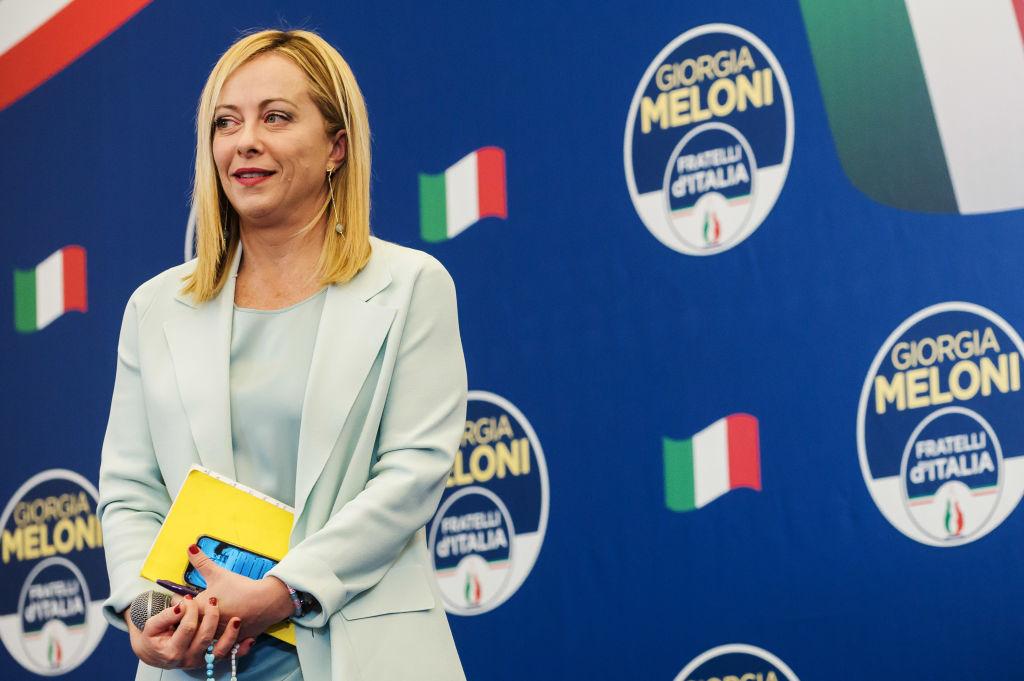
When a ‘shock’ or ‘extremist’ election result comes with record-low voter turnout and a big yawn from financial markets, it is time to find new descriptors. The decisive victory in Italy’s general election by the coalition led by Giorgia Meloni’s Brothers of Italy party, putting her in line to be the country’s first female prime minister and the first to claim an unambiguous line back to Benito Mussolini, is certainly striking. But there’s little reason to believe it will change Italy’s course in ways that matter either to markets or to the country’s international partners.
This election was that rare modern case in which opinion polls got the outcome largely right. It has been clear for at least two years that if the three main right-wing parties held together, they would win an absolute majority. The only thing that has changed materially is the balance within the coalition: during the technocratic, national unity government led by Mario Draghi from February 2021 until July this year, votes shifted away from the right-wing party that joined Draghi’s government, Lega, and to the party that stayed out, the Brothers of Italy.
This shift continued right up to the election, with the Brothers of Italy ending up with three times the vote share of either Lega, led by Matteo Salvini, or Meloni’s other coalition partner, Silvio Berlusconi’s Forza Italia. This will greatly strengthen her position when forming her government, making it likelier than not that her government will last several years, or even the full five-year parliamentary term.
The last time a coalition won a clear majority in an Italian general election was in 2008, when Berlusconi led the right to victory. Since 2011, there have been seven governments under six different prime ministers, two of which (Mario Monti and Draghi) were technocrats, while the other five relied upon creative and complex coalition negotiations. Compared with those, the Meloni victory promises simplicity and, at least in the medium term, stability.
In fact, Meloni’s victory largely reflects the instability of the last decade. And with Italy having been led mainly by leaders from the centre and left since 2011, it was arguably time for Italy to swing back to the right. And one of Meloni’s big attractions was that she is relatively young at 45 years old and untainted by any recent governmental decisions, popular or otherwise. The voter apathy that pushed turnout down to just 64% had a lot to do with disillusion with the old political guard.
Meloni’s most eye-catching characteristic has been fairly unimportant in her success. She leads a party that is unashamed of its origins among post-war supporters of Mussolini, the fascist dictator. The Brothers of Italy even keep as their party symbol a flame symbolising loyalty to the late Duce. Some members wear black shirts and even use the Roman salute most commonly associated with German Nazis, though it was Mussolini who popularised it.
For the time being, these neo-fascist associations are unimportant, because there is no sign of any upswell of support for violent methods or for subverting democracy. Meloni’s signature issues, which include a Trump-like ‘Italy first’ attitude towards illegal immigration and hostility to progressive social policies regarding LGBTQ communities or abortion, are essentially consistent with the programs of previous Berlusconi-led right-wing governments in 2001–06 and 2008–11, and of Lega in a left–right coalition 2018–19. Her opposition to foreign ownership of flagship national companies such as the former national airline Alitalia is also conventional.
So, despite many Italians’ disappointment that progressive social policies may now be reversed, there is little that is genuinely new in the program promised by Meloni. She will enter office not on a groundswell of enthusiasm but on a wave of disillusionment.
Unlike Salvini and Berlusconi, she has taken a resolutely anti-Russia and pro-Ukraine stance over the war, just like the outgoing Draghi. With Ukraine now making gains in that war, this is unlikely to change. Meloni may in the past have admired Russian President Vladimir Putin’s social conservatism, but she is not going to back a loser.
The big questions about the new government, at least for non-Italians, concern its economic policy. In his 18 months in office, Draghi put Italy’s economy in what might be described as a benign straitjacket: he wrote a public investment plan for Italy to receive €190 billion ($282 billion) from the European Union’s ‘NextGenerationEU’ scheme over five years, four of which still lie ahead. This entailed establishing a rigorous system for auditing and monitoring that expenditure, and agreeing to meet stringent conditions set by the European Commission before each tranche of payments is released.
As a self-declared ‘sovereigntist’, Meloni is no fan of strict conditions from Brussels. Nor, with the whole right-wing coalition backed by an array of vested interests among small and medium-size businesses, will she be a fan of pro-competition reforms or even rigorous auditing. But the large flows of cash from the EU will be crucial for Italy’s medium-term economic growth, implying that her sovereigntist instincts are set for a contest with pragmatic realism.
The new government will not be sworn in until late October and will immediately have to prepare a budget for 2023. Meloni’s choice of finance minister will be the most keenly watched appointment of all. It’s hard to imagine she will want to start her term by picking fights with the European Commission, especially with a tough northern winter of high energy prices and scarce gas ahead. But she is new and untested, so no one can be entirely sure.